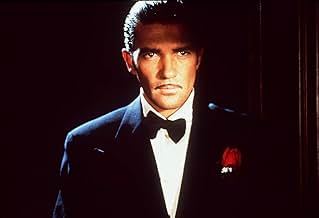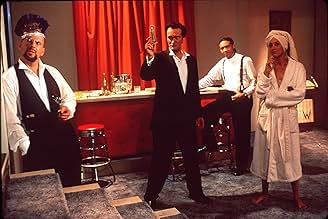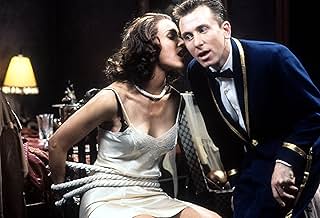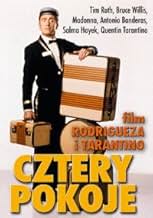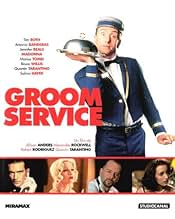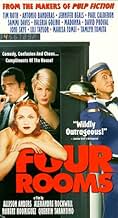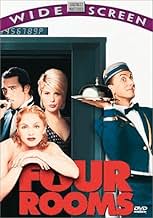Quatre histoires enchevêtrées qui se déroulent dans un hôtel en déclin la veille du jour de l'An.Quatre histoires enchevêtrées qui se déroulent dans un hôtel en déclin la veille du jour de l'An.Quatre histoires enchevêtrées qui se déroulent dans un hôtel en déclin la veille du jour de l'An.
- Prix
- 1 victoire et 1 nomination au total
Amanda De Cadenet
- Diana (segment "The Missing Ingredient")
- (as Amanda deCadenet)
Patricia Vonne
- Corpse (segment "The Misbehavers")
- (as Patricia Vonne Rodriguez)
Avis en vedette
It's impossible to analyze this film without breaking it down into its four segments for separate comment. It would also be improper, since it was not intended to be anything less than an anthology from four notable independent filmmakers: Alexandre Rockwell, Alison Anders, Robert Rodriguez, and Quentin Tarantino.
The first episode is exactly the sort of thing that someone in a high school drama production would want to do, but can't get away with in a high school drama production. It's juvenile, unfunny, and lifeless, but it has the (pointless) nudity and lines of dialogue like:
Witch #1: "I am your mother."
Witch #2: "Then why are we sleeping together?"
that sound like the screenwriter is giggling and thinking, "I can't believe I'm getting away with this! I'm so clever!"
Nothing is at stake in the first episode; it's generally expected that a story must have conflict in order to BE a story. This has none. Just some half-baked jokes and a pair of topless women (If I wanted that, I'd skip renting a movie and go out instead.)
Second episode is a hair better, but you'll find yourself crying "Why doesn't Ted the Bellboy do [insert plot resolution here] and get the bloody hell out of there!" When it finally does end, you're disheartened to find that it had no reason to exist. Two snips with a pair of scissors, a bit of tape, and we wouldn't know the difference. Roll opening credits, go straight to the Rodriguez segment.
Third episode has some structural support to keep it from caving in on itself. The surprise in the middle (I won't give it away, don't worry) is horrifying enough to give the segment some heft. Rodriguez and his d.p., Guillermo Navarro, move it along dexterously and (as usual) have a good handle on visual comedy.
The last segment is the best. I think it's safe to say that Quentin Tarantino has, officially, never disappointed me as a director or screenwriter. My heart leapt as soon as I heard his trademark dialogue coming from the lips of Marisa Tomei as "Four Rooms" segued from "The Misbehavers" to "The Man From Hollywood." I wasn't sure if his take on Ted the Bellhop's misadventures was going to be any good, but I knew that if he wrote it and helmed it, it wasn't going to be all bad.
What a pleasant surprise (still just talking about the fourth segment here). This part of the movie, with its ridiculous premise (lifted form an old Hitchcock episode, which it acknowledges out loud), moves along speedily, and the actors take to it as naturally as any other movies by Q.T. Basically playing himself, Tarantino is hilarious. If anything, he knows A) how people really act when they're drunk (i.e. not like Dudley Moore caricatures) B) why people think he's so obnoxious, like a real-life, fast-talking Jar Jar Binks and C) how to put some bang in his visual storytelling. It's low-rent Tarantino, don't get me wrong, but it's also the best part of "Four Rooms."
All in all, the first film I've ever seen that starts out with a loathsome, horrifying badness, gets incrementally better with each passing fifteen minutes, and ends as good as one would like. Just don't make me watch it again.
The first episode is exactly the sort of thing that someone in a high school drama production would want to do, but can't get away with in a high school drama production. It's juvenile, unfunny, and lifeless, but it has the (pointless) nudity and lines of dialogue like:
Witch #1: "I am your mother."
Witch #2: "Then why are we sleeping together?"
that sound like the screenwriter is giggling and thinking, "I can't believe I'm getting away with this! I'm so clever!"
Nothing is at stake in the first episode; it's generally expected that a story must have conflict in order to BE a story. This has none. Just some half-baked jokes and a pair of topless women (If I wanted that, I'd skip renting a movie and go out instead.)
Second episode is a hair better, but you'll find yourself crying "Why doesn't Ted the Bellboy do [insert plot resolution here] and get the bloody hell out of there!" When it finally does end, you're disheartened to find that it had no reason to exist. Two snips with a pair of scissors, a bit of tape, and we wouldn't know the difference. Roll opening credits, go straight to the Rodriguez segment.
Third episode has some structural support to keep it from caving in on itself. The surprise in the middle (I won't give it away, don't worry) is horrifying enough to give the segment some heft. Rodriguez and his d.p., Guillermo Navarro, move it along dexterously and (as usual) have a good handle on visual comedy.
The last segment is the best. I think it's safe to say that Quentin Tarantino has, officially, never disappointed me as a director or screenwriter. My heart leapt as soon as I heard his trademark dialogue coming from the lips of Marisa Tomei as "Four Rooms" segued from "The Misbehavers" to "The Man From Hollywood." I wasn't sure if his take on Ted the Bellhop's misadventures was going to be any good, but I knew that if he wrote it and helmed it, it wasn't going to be all bad.
What a pleasant surprise (still just talking about the fourth segment here). This part of the movie, with its ridiculous premise (lifted form an old Hitchcock episode, which it acknowledges out loud), moves along speedily, and the actors take to it as naturally as any other movies by Q.T. Basically playing himself, Tarantino is hilarious. If anything, he knows A) how people really act when they're drunk (i.e. not like Dudley Moore caricatures) B) why people think he's so obnoxious, like a real-life, fast-talking Jar Jar Binks and C) how to put some bang in his visual storytelling. It's low-rent Tarantino, don't get me wrong, but it's also the best part of "Four Rooms."
All in all, the first film I've ever seen that starts out with a loathsome, horrifying badness, gets incrementally better with each passing fifteen minutes, and ends as good as one would like. Just don't make me watch it again.
It's a pity that the critics gave 'Four Rooms' as hard a time as they did back in 1995, because, for everything that can be said to be wrong with it, it really does sparkle with creativity and a desire to stand out from the rest of the crowd. And let's face it, there was enough popular talent involved, including Alison Anders, Alexandre Rockwell, Robert Rodriguez and, last but not least, Quentin Tarantino, for it to have been hailed as an instant cult classic. Instead, it was bashed into submission and retreated very quickly to the back of nearly everyone's resume. With retrospect most of this reproach was probably ill-deserved - 'Four Rooms' does have its blatant moments of weakness, but then again so do a lot of the more half-baked cookie-cutter comedies which have somehow garnered more admiration than this. On the whole it's a very unusual and interesting combination - an offbeat, frisky and strangely feel-good comedy with some sinister undertones and lots of weird, intricate little details. Consisting of four 20-minute segments, each assembled by a different director's hands, it takes us through the various happenings inside separate rooms of the same hotel on New Year's Eve, as experienced by Ted, the only bellhop still left standing for the night shift. There is the slight feeling of inconsistency in moving from one directing style to the next, and a couple of attempts to interconnect the segments are a little self-contradictory. Some of it works and some it doesn't, but the end result is an episodic anthology that, if nothing too spectacular, still proves itself to be very likable in the long run.
'The Missing Ingredient' and 'the Wrong Man' are often credited with constituting the weaker half of the film, and I can't really say I disagree. 'The Missing Ingredient' tries hard to be risqué, but falls pretty short - for a story concerning a coven of bare-breasted witches trying to extract an unwilling man's semen for use in a ritual, it's remarkably innocuous and fluffy, and the visual effects only add a layer of tackiness to boot. 'The Wrong Man' is a tad more snappy and sports some stylish direction (the shot where Sigfried grabs the ringing telephone is right-on), but is ultimately swallowed up in its frenzied editing. We can vaguely understand what's happening in this segment (if not, then Ted does drop a pretty big hint later on in the film), but it makes itself unnecessarily incoherent, with bizarre imagery that adds nothing but extra confusion (the baby flashback, anyone?). It's almost as though Alexandre Rockwell isn't sure whether he wants us to be in on the whole set-up with Sigfried and Angela, or confused and in the dark like Ted, and in the end tries to accommodate both perspectives, which doesn't really wash.
It's once we reach the second half that the true quality really starts to seep its way in, and the film suddenly becomes very rewarding. 'The Misbehaviours' is a spirited little contribution that combines a moderate dose of macabre darkness with its cartoon-like innocence. Antonio Banderas certainly hits a good spot as the no-nonsense father who appoints Ted to keep an eye on his two young children while he's out, whilst the children themselves are rebellious but not irritating, all making for a surprisingly sharp and sophisticated slice of knockabout. 'The Man from Hollywood', meanwhile, is equally brilliant - Tarantino's vibrant, well-scripted take on Roald Dahl's chilling short story, 'the Man from the South', which pits Ted in the same room as cocky Hollywood director Chester Rush (and it's always a treat to see Quentin himself tackle such a winking, self-depreciating role). It manages to be tense and enjoyable, with the usual smart direction that any Tarantino fan should be able to appreciate. Overall, there's enough vitality in these particular segments to just about redeem the shakiness of the first half.
Besides, we have Tim Roth playing our hapless protagonist throughout, and, yes, that is a lot. He proves himself to be very capable in a comic performance, bringing enough gentle magnetism to his character Ted the bellhop, through his good intentions, perseverance and various neurotic mannerisms, to get us genuinely attached to him. It is hard not to come away with the impression that all four directors had a slightly different take on Ted's disposition - he goes from being timid and impressionable to obtuse and jumpy, then highly-strung and a little devious, and finally composed and relatively rational - but Roth does well in single-handedly bridging these gaps and, with the many mishaps his character has to endure over the course of the night, ensures that all changes in temper seem understandable. He retains his good-natured lovability for the entire running time, and, for anyone who can really relate to poor Ted (like yours truly), he'll have you rooting for him to the very satisfying end.
To my knowledge, there was never any other film quite like 'Four Rooms' and, judging by just how unwelcome this one was made to feel when it arrived, there probably won't be another for quite some time. It remains an ambitious and not entirely successful little sleeper, but has a good deal going for it nonetheless, and I urge all fans of Tarantino, Rodriguez and Roth in particular not to be put off by the bad press and to give it a chance. Who knows? One day, it might just make a fresh start and find the cult audience that appreciates it yet.
'The Missing Ingredient' and 'the Wrong Man' are often credited with constituting the weaker half of the film, and I can't really say I disagree. 'The Missing Ingredient' tries hard to be risqué, but falls pretty short - for a story concerning a coven of bare-breasted witches trying to extract an unwilling man's semen for use in a ritual, it's remarkably innocuous and fluffy, and the visual effects only add a layer of tackiness to boot. 'The Wrong Man' is a tad more snappy and sports some stylish direction (the shot where Sigfried grabs the ringing telephone is right-on), but is ultimately swallowed up in its frenzied editing. We can vaguely understand what's happening in this segment (if not, then Ted does drop a pretty big hint later on in the film), but it makes itself unnecessarily incoherent, with bizarre imagery that adds nothing but extra confusion (the baby flashback, anyone?). It's almost as though Alexandre Rockwell isn't sure whether he wants us to be in on the whole set-up with Sigfried and Angela, or confused and in the dark like Ted, and in the end tries to accommodate both perspectives, which doesn't really wash.
It's once we reach the second half that the true quality really starts to seep its way in, and the film suddenly becomes very rewarding. 'The Misbehaviours' is a spirited little contribution that combines a moderate dose of macabre darkness with its cartoon-like innocence. Antonio Banderas certainly hits a good spot as the no-nonsense father who appoints Ted to keep an eye on his two young children while he's out, whilst the children themselves are rebellious but not irritating, all making for a surprisingly sharp and sophisticated slice of knockabout. 'The Man from Hollywood', meanwhile, is equally brilliant - Tarantino's vibrant, well-scripted take on Roald Dahl's chilling short story, 'the Man from the South', which pits Ted in the same room as cocky Hollywood director Chester Rush (and it's always a treat to see Quentin himself tackle such a winking, self-depreciating role). It manages to be tense and enjoyable, with the usual smart direction that any Tarantino fan should be able to appreciate. Overall, there's enough vitality in these particular segments to just about redeem the shakiness of the first half.
Besides, we have Tim Roth playing our hapless protagonist throughout, and, yes, that is a lot. He proves himself to be very capable in a comic performance, bringing enough gentle magnetism to his character Ted the bellhop, through his good intentions, perseverance and various neurotic mannerisms, to get us genuinely attached to him. It is hard not to come away with the impression that all four directors had a slightly different take on Ted's disposition - he goes from being timid and impressionable to obtuse and jumpy, then highly-strung and a little devious, and finally composed and relatively rational - but Roth does well in single-handedly bridging these gaps and, with the many mishaps his character has to endure over the course of the night, ensures that all changes in temper seem understandable. He retains his good-natured lovability for the entire running time, and, for anyone who can really relate to poor Ted (like yours truly), he'll have you rooting for him to the very satisfying end.
To my knowledge, there was never any other film quite like 'Four Rooms' and, judging by just how unwelcome this one was made to feel when it arrived, there probably won't be another for quite some time. It remains an ambitious and not entirely successful little sleeper, but has a good deal going for it nonetheless, and I urge all fans of Tarantino, Rodriguez and Roth in particular not to be put off by the bad press and to give it a chance. Who knows? One day, it might just make a fresh start and find the cult audience that appreciates it yet.
I've decided to review each segment separately, this may take a while so if you can't be bothered please feel free to move on, but I'm trying to save you time and money.
Segment#1: The Missing Ingredient
Aka this biggest piece of sh*t I've ever had the (dis)pleasure of viewing. If you want to see how not to make a short story then watch this segment, it's badly timed, badly judged, badly acted - just plain bad. I gave up watching the film on the first attempt because this was just awful, why the hell did they cast Madonna, avoid at all costs. (1/10)
Segment#2: The Wrong Man
Things don't get much better in Rockwell's piece, the cinematography and production design are nice but besides that the entire thing is just dull, the plot is just too deeply structured to work on this small running time. More threatening than comedic; let's move on. (3/10)
Segment#3: The Misbehavers
Believe what others have written, this IS the reason to watch this movie, brilliant non-stop hilarity as Tim Roth's Ted the Bellboy is left in charge of two brat-ish troublesome kids. Rodriguez has a great handle on the mixture of slapstick farce and black comedy that's very satisfying. Things can only get better... (9/10)
Segment#4: The Man From Hollywood ...Except they don't. Tarantino's segment is good enough, lots of experiments with primary colours and long stedicam tracking shots, but you can't help thinking the film is just pandering to Tarantino's ego (he play's the biggest star in Hollywood). But the ending works well and the tension built is fantastic. (8/10)
To finish, Four Rooms would have been better if they had scraped the first two monstrosities (Anders and Rockwell where riding the coattails of Rodriguez and Tarantino anyway and have no where near as much talent) and kept the film as an hour-long TV special. If you must watch it, fast forward the first two segments, you'll save a lot of time and effort...
Overall rating 4/10
Segment#1: The Missing Ingredient
Aka this biggest piece of sh*t I've ever had the (dis)pleasure of viewing. If you want to see how not to make a short story then watch this segment, it's badly timed, badly judged, badly acted - just plain bad. I gave up watching the film on the first attempt because this was just awful, why the hell did they cast Madonna, avoid at all costs. (1/10)
Segment#2: The Wrong Man
Things don't get much better in Rockwell's piece, the cinematography and production design are nice but besides that the entire thing is just dull, the plot is just too deeply structured to work on this small running time. More threatening than comedic; let's move on. (3/10)
Segment#3: The Misbehavers
Believe what others have written, this IS the reason to watch this movie, brilliant non-stop hilarity as Tim Roth's Ted the Bellboy is left in charge of two brat-ish troublesome kids. Rodriguez has a great handle on the mixture of slapstick farce and black comedy that's very satisfying. Things can only get better... (9/10)
Segment#4: The Man From Hollywood ...Except they don't. Tarantino's segment is good enough, lots of experiments with primary colours and long stedicam tracking shots, but you can't help thinking the film is just pandering to Tarantino's ego (he play's the biggest star in Hollywood). But the ending works well and the tension built is fantastic. (8/10)
To finish, Four Rooms would have been better if they had scraped the first two monstrosities (Anders and Rockwell where riding the coattails of Rodriguez and Tarantino anyway and have no where near as much talent) and kept the film as an hour-long TV special. If you must watch it, fast forward the first two segments, you'll save a lot of time and effort...
Overall rating 4/10
Four Rooms, the 4 part directed, 4 part written mix-matched movie turns out to be an awesome combination. With Robert Rodriguez and Quentin Tarantino working on this film, you seem to expect a trigger-happy film festival with plenty of bombs and explosives to spare. But what the final product turns out to be is a laugh-out-loud comedy which follows a bellhop's mishaps one night as he scrambles to keep his hotel in order. Tim Roth is always a great performer and in this movie there is no difference. Kudos indeed.
I seem to recall that when "Four Rooms" came out, it was critically and commercially derided. When I saw it a few months later, I actually thought that it was pretty well done. I knew that Quentin Tarantino was involved in the making, so I could safely assume that there was an element of sleaze in the movie.
Well, the movie is likely to blow anyone away, just in terms of how far they go. Portraying bellhop Ted (Tim Roth) and his loony experiences on New Year's Eve while waiting on several people in a hotel, they blow everything out of the water. The first two segments are pretty lowbrow: the first one portrays a witches' coven and the second one portrays a psychopath who thinks that Ted had sex with his wife.
But when we get to the third segment, that's where the movie really takes off. Ted has to watch the children of a slick Mexican guy named Man (Antonio Banderas). After a few incidents, Man comes back and finds the room in the most mind-blowing scene imaginable. And, the last segment. Ted, in a totally frenetic state, goes to a room where several Hollywood guys are having a discussion (with as many curse words as possible). What happens at the end of that segment...well, let me just tell you that no one sees that coming! All in all, people who think that the movie didn't go anywhere obviously missed the point. I don't know for certain whether this movie was just an excuse to be crazy, but it sure seemed like that. You're sure to have fun watching it. Also starring Madonna, Valeria Golino, Jennifer Beals, Salma Hayek, and even Quentin Tarantino in the final segment playing a Hollywood type.
Well, the movie is likely to blow anyone away, just in terms of how far they go. Portraying bellhop Ted (Tim Roth) and his loony experiences on New Year's Eve while waiting on several people in a hotel, they blow everything out of the water. The first two segments are pretty lowbrow: the first one portrays a witches' coven and the second one portrays a psychopath who thinks that Ted had sex with his wife.
But when we get to the third segment, that's where the movie really takes off. Ted has to watch the children of a slick Mexican guy named Man (Antonio Banderas). After a few incidents, Man comes back and finds the room in the most mind-blowing scene imaginable. And, the last segment. Ted, in a totally frenetic state, goes to a room where several Hollywood guys are having a discussion (with as many curse words as possible). What happens at the end of that segment...well, let me just tell you that no one sees that coming! All in all, people who think that the movie didn't go anywhere obviously missed the point. I don't know for certain whether this movie was just an excuse to be crazy, but it sure seemed like that. You're sure to have fun watching it. Also starring Madonna, Valeria Golino, Jennifer Beals, Salma Hayek, and even Quentin Tarantino in the final segment playing a Hollywood type.
Le saviez-vous
- AnecdotesThe reason Bruce Willis is not credited is because he violated SAG rules for acting in this film for no money. He appeared for fun and as a favor to Quentin Tarantino, and acting for free violated SAG rules. SAG agreed not to sue Willis if his name was not included in the credits.
- GaffesWhen Ted leaves the room with the married couple, his hair is visibly shorter than when he was in the room.
- Citations
Angela: Whether you like it or not, you are in the middle of a situation here you cannot just wish your way out of.
Ted the Bellhop: But I've never met you people before! You're complete strangers!
Angela: Everybody starts out as strangers, Ted. It's where we end up that counts.
- Générique farfeluBruce Willis does not apear in the credits but his hairstylist does
- Autres versionsAs indicated in the Technical Specifications link for this page on IMDB, there are two different versions of this film: "1 hr 38 min (98 min)" and "1 hr 50 min (110 min) (workprint)". Information on the workprint is as follows: "[The] second version is in English but it is overdubbed with Russian. This makes it almost impossible to work out what is extra as the Russian is much louder than the English and therefore the English cannot be heard for the majority of the movie. I have done some research and have been told that it is impossible to remove the Russian audio. The disc also contains a deleted scene from the Spanish DVD that is an alternate take, not used in either the DVD Version or the Workprint."
- ConnexionsFeatured in Cinemania: Ypalliloi en drasei! (2009)
- Bandes originalesSentimental Journey
Written by Bud Green, Les Brown, Ben Homer
Performed by Juan García Esquivel (as Esquivel)
Courtesy of The RCA Records label of BMG Music
Meilleurs choix
Connectez-vous pour évaluer et surveiller les recommandations personnalisées
- How long is Four Rooms?Propulsé par Alexa
- Does This Take Place In Chronological Order?
Détails
- Date de sortie
- Pays d’origine
- Site officiel
- Langue
- Aussi connu sous le nom de
- Four Rooms
- Lieux de tournage
- sociétés de production
- Consultez plus de crédits d'entreprise sur IMDbPro
Box-office
- Budget
- 4 000 000 $ US (estimation)
- Brut – États-Unis et Canada
- 4 257 354 $ US
- Fin de semaine d'ouverture – États-Unis et Canada
- 427 733 $ US
- 25 déc. 1995
- Brut – à l'échelle mondiale
- 4 257 354 $ US
- Durée1 heure 38 minutes
- Couleur
- Mixage
- Rapport de forme
- 1.85 : 1
Contribuer à cette page
Suggérer une modification ou ajouter du contenu manquant




